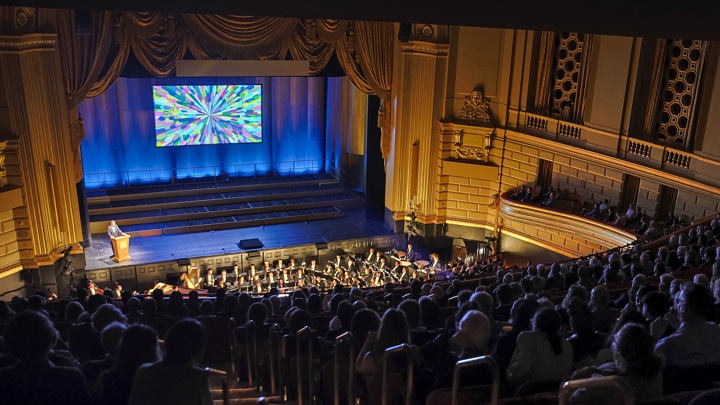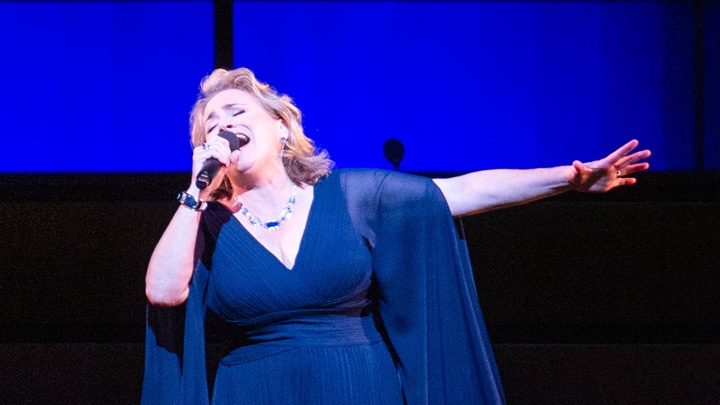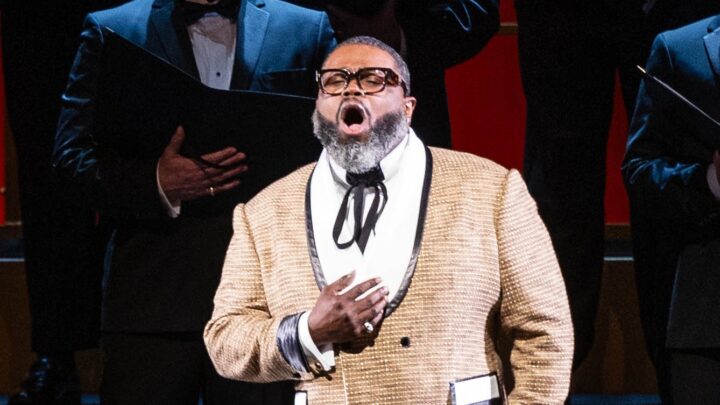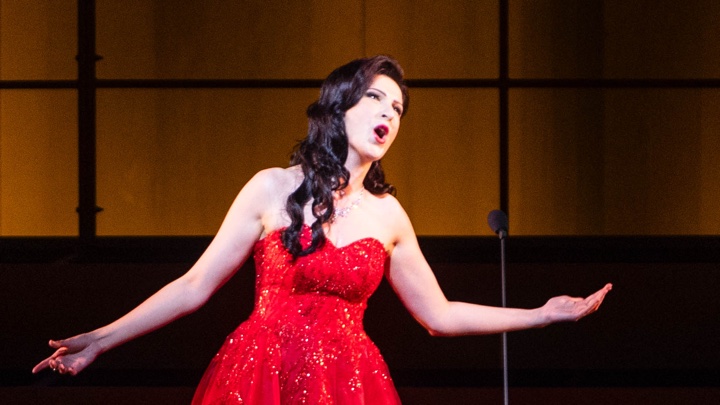

Since then the Company burgeoned into one of the most respectable opera companies in the US, regularly featuring world-class singers and conductors, and premiering significant new works that subsequently became mainstay in the opera repertoire, including 1957 Dialogues des Carmélites, 1959 Die Frau ohne Schatten and the world premiere of the company’s former public relations manager Jake Heggie’s first opera Dead Man Walking in 2000, which subsequently became one of the most widely performed American operas (and will open the next season at the Metropolitan Opera.)
It’s important to note that historically, San Francisco Opera was only the third opera companies in the US that had celebrated Centennial milestone, following the Metropolitan Opera (in 1983) and Cincinnati Opera (during the pandemic in 2020).
One particular aspect that was truly remarkable during that 100-year history was the creation of not just one training program for young opera singers, but two: the 1957 Merola Opera Program – a summer training program, one of the finest in the US – and the 1977 Adler Fellowship program, a prestigious advantage training program selected from the Merolinis (nickname for Merola alumni.)
Both programs had launched the careers of countless opera singers around the world, so it was heartening to see the appearance of six Merolini (and three Adler Fellows) on the stage: Susan Graham (1987), Patricia Racette (1988), Lucas Meachem (2003), Ailyn Pérez (2005), Daniela Mack (2007) and conductor Patrick Summers (apprentice coach 1986 and 1987).
In fact, that feeling of nostalgia permeated the stage for the June 16 concert. For this, SF Opera seemed to eschew the usual glitzy gala fares to present something more like a gathering of friends and family of the Company.
With a practically bare stage, adorned only by SF Opera’s Concert Shell and a giant screen as background plus a podium (the Orchestra was placed in the pit), the three-hour concert was essentially a display of camaraderie, friendship and particularly respect among the soloists, the conductors and the members of the Orchestra and the Chorus, as evident by the interactions among them, many of whom had appeared on the War Memorial stage multiple times.
The SF Opera General Director Matthew Shilvock even stressed that point in his welcome message printed in the program: “In this concert, we will delve into the many strands of repertoire, with some of today’s greatest artists and cherished friends, and we will share in the memories of our stage through the imagery from our past.”
In that sense, the Concert truly achieved the objective, presenting a sensitively curated program – each piece representing a portion of SF Opera’s 100-year history – with a set of familiar soloists to the SF Opera stage. Only Lawrence Brownlee (2016 Don Pasquale) and Adela Zaharia (2022 Don Giovanni) among the cast have appeared here in just one previous season.
It might also explain why there was not much appearance from the Die Frau ohne Schatten star-studded cast other than Nina Stemme and former Music Director Donald Runnicles, both of which were the recipients of San Francisco Opera Medal for distinguished service over many years.
Nevertheless, the Concert was a beautiful trip down the memory lane for the long-time supporters of the San Francisco Opera, many of whom filled the hall last Friday, especially aided by the multiple photographs and production pictures from the past as background. Sometimes those images were tied to the specific opera (Tosca particularly) or composers (Puccini or Mozart) related to the aria being sung, other times they were a collection of SF Opera archive pictures over the years.
In the first part of the concert (before intermission), one of the highlights was the often-omitted Act 2 aria from Giuseppe Verdi’s Ernani “Odi il voto”, sang eloquently by tenor Russell Thomas with power and vigor with the SF Opera Chorus, conducted by Eun Sun Kim, SF Opera’s current Music Director. This performance marked the first time the aria was heard on SF Opera stage, even though Ernani had been staged twice before (1968 and 1984). Thomas was originally scheduled to sing the role in the cancelled Summer 2020 production due to Covid.
That aria was followed with a gorgeous account of Pierrot’s Tanzlied from Erich Wolfgang Korngold’s Die tote Stadt, sang by the original Fritz of the 2008 SF premiere, Meachem, and conducted by Runnicles. The song had been Meachem’s calling card, and here he dialed up the longing quality of the song, perfect for the occasion.
Runnicles also brought out the rarely heard Hector Berlioz’s 1859 French version of “Amour, viens render à mon âme” from Christoph Gluck’s Orphée et Eurydice, sang by Mack. Mack’s dark round tone, coupled by Berlioz’s heavier orchestration, truly showed the Orpheus’ bold determination to win Eurydice back. The performance was a great reminder that Runnicles recorded the Berlioz version in 1995 with the SF Opera Orchestra and Jennifer Larmore and Dawn Upshaw in the title roles.
Italian verismo had always been a staple in SF Opera repertoire, so it wasn’t surprising that the first half wrapped up with a series of Italian verismo best examples, starting with Michael Fabiano and Pérez’s intense “Vicino a te” duet from Andrea Chénier and concluding with Christian Van Horn’s beautiful (if slightly underpowered) “Te Deum” from Tosca with the SF Opera Chorus. Tosca held a special place for SF Opera, as the piece inaugurate the War Memorial Opera House in 1932 and marked the return to the War Memorial for both 1997 (after earthquake retrofitting project) and 2021 (after covid closure).
The second portion, if anything, was even more exciting, particularly in the beginning part of it. Runnicles showed why he was the designated SF Opera’s Richard Wagner conductors over the years with his steady handling of “Entrance of the Guests” from Wagner’s Tannhäuser, the second Wagner opera that entered the Company’s repertoire. He upped the ante in showcasing the Orchestra and particularly the Chorus, led by John Keene, and they rose to the occasion splendidly, giving the audience a thrilling welcome back into the hall.
After Graham’s rapturous and uninhibited speech about what the Company meant to “singers, conductors, administrators, stage crews, dressers”, the importance of the Merola and Adler Fellowship in opening doors, and how the Company took risk, three amazing 20tthcentury pieces followed as if to prove Graham’s assertions and became the crowning glories of the night.
Brian Mulligan gave a blistering performance as J. Robert Oppenheimer in “Batter My Heart” from John Adams’ Doctor Atomic, a SF Opera commission and the first of the three Adams operas that received world premiere in War Memorial stage. Mulligan brought out gravitas and dignity into the John Donne’s sonnet, clearly showing a person grappling with the consequences of his actions.
Not to be undone, Karita Matilla reprised her spectacular turn (and staged role debut) as Kostelni?ka in 2016 production of Leoš Janá?ek’s Jen?fa with “Co chvila”, sang with searing desperation and bright clarity of voice, aided handsomely by Runnicle’s moving direction.
SF Opera embraced the American Musical Theater tradition in its history, including the 2009 Porgy and Bess, 2014 Show Boat and 2015 Sweeney Todd. Following that tradition, Racette (with a mic) presented a heartbreaking “Losing My Mind” from Stephen Sondheim’s Follies. The song might have meant a lot for her, as she visibly held back the tears throughout the song.
The festivities of the night concluded with the spectacular rendition of the haunting “Ave Signor” chorus from Boito’s Mefistofele led by Kim, bringing the retrospective Concert to its glorious end. It was a perfect full-circle moment linking back to the beginning of the century and ending the era on a high note!
Next season, SF Opera will present three brand-new works namely The (R)evolution of Steve Jobs, Omar and Innocence, a new first for a company that in the past often relied heavily onto Italian verismo operas. To echo Graham’s sentiments, this bold risk-taking move needs to be applauded and celebrated and hopefully the audience will appreciate it too. So, here’s to the next 100 years (and beyond) of San Francisco Opera!




























Comments